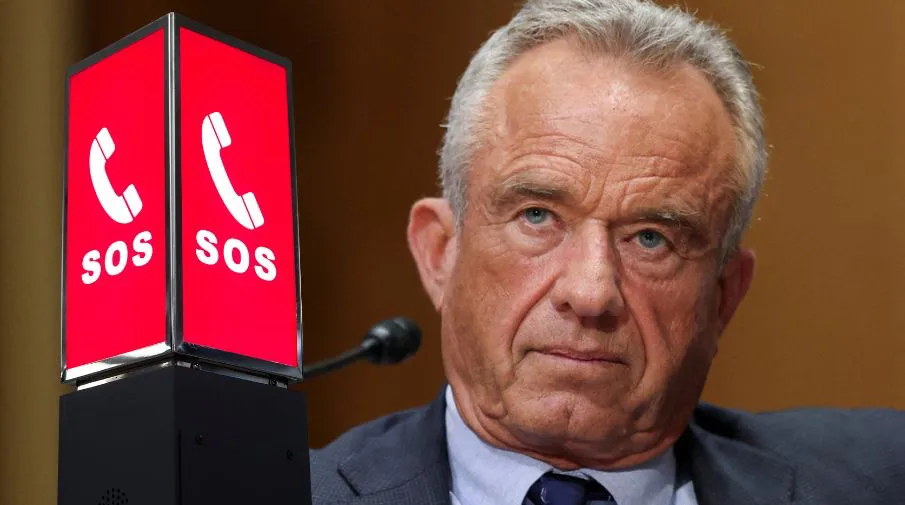It is a sentence that will likely go down in the chronicle of political distortions: Robert F. Kennedy Jr., Health Secretary of the United States, declared before the UN that an international declaration on combating chronic disease was tainted with abortion propaganda and “radical gender ideology.” A document that in truth formulates sober goals such as curbing cancer, heart attacks and diabetes was abruptly turned by him into an enemy image. Anyone who looks at the text of the declaration immediately sees the abyss between claim and reality. Neither “abortion” nor “gender ideology” appear in it. The word “gender” appears only in connection with the particular health burdens that women face worldwide – maternal mortality, lack of access to preventive care or inequality in medical treatment. And yet Kennedy turned it into a global conspiracy against “innocent life.”
Further quotes from another world: “More than 40 million people die around the world each year from chronic disease, and 7 out of the 10 most common causes of death are chronic disease.” – “We cannot defeat the epidemic alone, but the UN’s approach is misdirected.” – “That is why the US will reject it.” – “We cannot accept language that pushes destructive gender ideology.” – “Neither can we accept claims of a constitutional or international right to abortion.” – “The US will walk away from the declaration – but we will never walk away from the world or from our commitment to end chronic disease.”
It is not the first time that the Trump administration has sabotaged international cooperation in health care. Previously President Trump had already announced the withdrawal of the US from the WHO – under the pretext that the organization had mismanaged the coronavirus pandemic. Now the same course is being continued: isolation instead of cooperation, ideology instead of evidence. Kennedy’s speech before the delegates seemed like a script from another reality. He warned that chronic diseases had more than doubled within a generation, that millions of children were already losing healthy years at a young age – a finding that exactly matches the UN’s assessments. But instead of drawing consequences from it, he refused to join forces with the international community. He painted the picture of an America that fights disease alone, because international bureaucrats supposedly “undermine the sovereignty of nations.”
Health experts reacted appalled. “Disturbing, misleading and full of contradictions,” Paula Johns of the Brazilian organization ACT Health Promotion called Kennedy’s appearance. She made it clear: anyone who talks about international cooperation and at the same time refuses every form of cooperation is engaging in political theater, not health policy. Other voices also spoke of sabotage. Alison Cox of the NCD Alliance emphasized that the declaration was the result of months of negotiations between experts, civil society and states. It was imperfect but a decisive step in the global fight against diseases that cost millions of lives each year. And she noted: the US was alone with its blockade stance – just as it was on climate policy. In fact, the document had already been watered down on a crucial point: demands for high taxes on tobacco, alcohol and soft drinks, as well as drastic warning labels, had been deleted from the text – under pressure from industry interests. Even this compromise was not enough for Washington.
Kennedy invoked the “biological reality of sex” – a phrase that has long since become a battle cry of Christian fundamentalist networks. That this caused head shaking among international experts is no surprise. While WHO Director General Tedros Adhanom Ghebreyesus once again warned that health begins in homes, schools and workplaces, the US Secretary reached for ideological catchphrases that have nothing to do with cancer prevention or nutrition policy.

The numbers are crushing: 17 million people die prematurely worldwide each year from non-communicable diseases. One trillion dollars in tax revenue could be mobilized in the next ten years if tobacco, alcohol and sugary drinks were more heavily taxed – money that could flow into prevention and treatment. But while Tedros spoke of a chance to save 50 million lives, Kennedy declared that America could not join these goals. The investigative question remains: why does a health secretary risk the isolation of his country in one of the greatest health crises of our time? The answer is obvious: not because he has recognized the “most pressing problems” of humanity, but because he wants to serve his own political clientele – those voters who see a conspiracy in every international agreement, and those lobby groups that want to prevent taxes on sugar, alcohol and tobacco at all costs.
Thus a paper on cancer, heart disease and diabetes becomes a supposed crusade against “innocent life.” And thus a country that once was a pioneer in the fight against global disease remains behind as a plaything of ideological obsessions. This he actually believes – and that is exactly what makes it so dangerous.
Investigative journalism requires courage, conviction – and your support.
Please support our journalistic fight against right-wing populism and human rights violations. We do not want to finance our work through a paywall, so that everyone can read our investigations – regardless of income or background.

Unschuldige Leben … ein Leben ist per se immer Unschuldig.
Hauptsache man bedient mit Schlagworten seine Klientel.
Abtreibungskomplott, Genderideologie, Impfwahnsinn.
Auf der Strecke bleibt die Gesundheit.
Die kann man nur mit wissenschaftlicher Evidenz erhalten bzw behandeln.
Nicht mit Schwurbelei und Verschwörungstheorien.
Kennedy versprach ganz hart gegen Zucker in Softdrinks, gegen stark verarbeitete Lebensmittel, Alkohol etc vorzugehen.
Dann kam die Lobby und die Pläne waren vom Tisch.
Geblieben sind wissenschaftliche Forschungen, die aufgrund gestrichener Mittel beendet werden mussten.
Impfprogramme die gestrichen werden.
Verbot von Fluor im Trinkwasser, was sich deutlich auf die Zahngesundheit der ärmeren Bevölkerungsschichten auswirken wird.
Make America healthy again ist zu make America most unhealthy ever geworden.
Eigentlich müsste man ihn verklagen.
Aber bis auf ein paar kritisch Stimmen schweigen die Länder wieder einmal.